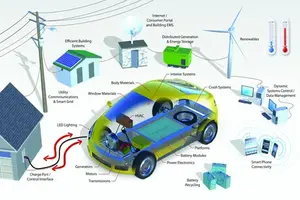Electric vehicles
Electric vehicles (EVs) will only increase this challenge. Fully Electric vehicles do not have the support of an additional power source such as ICE. All the energy the vehicle needs is supplied by the energy stored in the batteries.
As a result, the number and sophistication of an electric vehicle’s electronic components has a direct impact on the vehicle’s range and performance. ADAS systems often include cameras, radar, and ultrasonic sensors that enable lane departure warning systems, automatic braking, and more.
Working of Electric vehicles
These systems are constantly draining the battery because they are always active. To increase the efficiency of E/E systems and thus the range of drives, engineers will need to conduct architecture and trade-off analyzes to explore architectural designs.
Trade-off analyzes for Electric vehicles will need to consider hundreds of components and millions of signals while optimizing feature placement, network latency, error rate, and more. In addition, engineers will have to manage the high-voltage lines that transmit power to the electric motor or motors. These lines often require special design guidelines regarding routing and bundling to be considered.
Electric vehicles are more than just a novel mode of transportation. They have been identified as an essential component of the energy transition. Fulfilling their promise will necessitate significant changes in the technical, digital, and social aspects of transportation and energy infrastructure. If you want to learn about the cutting-edge technology that powers electric vehicles, this is the course for you!
This course focuses on the technology that underpins electric vehicles. You will learn about the working principles of electric vehicles with various operations such as regenerative braking, as well as the machines and power electronics used in electric vehicles and the technology behind their operation. You will also learn about battery technology, EV charging, smart charging, battery management systems, and thermal systems, as well as future trends in the development of electric vehicles such as autonomous driving.
The course includes video lectures, presentations, and exercises, all of which are illustrated with real-world case studies from projects carried out in the Netherlands. Lightyear One EV, Carver EV, ABB EV charging infrastructure, and the Vattenfall solar race team are all part of this.
This course was co-created by the Dutch Innovation Centre for Electric Road Transport (Dutch-INCERT) and TU Delft, and it is taught by industry and academic experts who share their knowledge and insights.
Contact us to Join the course to stay up to date on the latest developments in the transition to electric vehicles!

Electric vehicles
- Rs 40,000/-
- Course Duration 1 Month
- Online Session
- On Campus Lecture + Practical
- Video Lecture Available
- Urdu & English
- 24/7 Support
- Fee: 40,000
- Duration: 1 Month
- Timing: 9AM-11AM, 11AM-1PM, 1PM-3PM, 3PM-5PM, 5PM-7PM, 7PM-9PM
